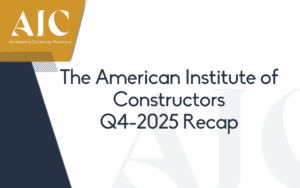Construction managers occupy a pivotal space in the commercial construction realm. And, as more demands are placed on commercial construction managers, there is a greater need for highly skilled and knowledgeable constructors to spearhead projects.
For managers looking to advance in this field, a proactive approach to personal and professional development is essential. Knowing where to focus your efforts and which specific steps to take can help managers advance in their careers. The American Institute of Constructors (AIC) is here to help point you in the right direction.
Commercial Construction Management: Best Practices for Career Growth
Keeping a few basic things in mind can help you grow significantly in the world of commercial construction management. Building up skills and learning new methods will help you in the long run and improve your career. Consider these four best practices.
1. Embrace Lifelong Learning
The construction industry constantly changes, with new technologies, materials, and regulations emerging regularly. To stay ahead, construction managers must commit to lifelong learning to stay ahead of the curve on changes that could affect large-scale commercial projects.
This effort involves staying updated on industry trends, attending workshops and seminars, and pursuing relevant certifications, such as the professional certifications offered by AIC.
Focusing on continuous education can enhance your knowledge and make you more adaptable to industry shifts. You’ll be positioned as a valuable asset to your organization, project owners, and the industry as a whole.
2. Develop Strong Leadership Skills
Construction management is not just about overseeing projects; it’s about leading teams and ensuring everyone works cohesively toward a common goal. Developing strong leadership skills is crucial for advancing in this field.
Effective communication, conflict resolution, and team motivation are key aspects of leadership that can significantly impact project outcomes. By honing these skills, you can build a reputation as a reliable and effective leader, which is essential for career progression.
You may also translate your skills, experience, and knowledge into providing valuable leadership for the next generation of construction managers. For example, you may be asked to train managers before they are assigned their first commercial construction project or to develop a training program that can be deployed throughout your organization.
3. Build a Strong Professional Network
Networking plays a critical role in career advancement. Building relationships with other professionals in the industry can open doors to new opportunities, provide mentorship, and offer valuable insights into the construction industry.
You should aim to attend industry events, join professional organizations, and connect with peers on platforms like LinkedIn. A strong professional network can be a powerful tool in navigating your career path and advancing in the field.
4. Master Project Management Tools
The ability to effectively manage projects is at the core of construction management. Mastering construction project management software and tools is essential for streamlining processes, improving efficiency, and ensuring that projects are completed on time and within budget.
You will want to become an expert in the industry-standard tools used in commercial construction projects. Proficiency in these tools can set you apart from your peers, demonstrate your ability to manage complex projects, and show others how to use critical tools in real-time.
Specific Actions for Commercial Construction Management
Now that we’ve shared some best practices, let’s dive into some specific action items. Here are a few steps you can take to help advance in your career.
1. Pursue Advanced Certifications
Earning advanced certifications is a tangible way to demonstrate your commitment to your profession and to enhance your qualifications. If you have already passed our CAC Level I exam, consider sitting for the CPC Level II exam.
Gaining both certifications will signal to your company and the owner of a commercial construction project that you can meet the highest standards expected for construction work.
2. Gain Experience in Diverse Project Types
Expanding your experience across different types of commercial construction projects can make you a more versatile and valuable manager. Seek opportunities to work on a variety of projects, including high-rise buildings, healthcare facilities, retail spaces, and educational institutions.
The broader your experience, the better equipped you will be to handle the unique challenges of different project types. This versatility can lead to more significant responsibilities and opportunities for advancement.
3. Take on Challenging Assignments
One of the most effective ways to advance in commercial construction management is by taking on challenging assignments that push you out of your comfort zone. Volunteer for complex projects, lead large teams, volunteer to develop an internal training program, or manage projects with tight deadlines and budgets.
These experiences will help build your skills, showcase your ability to handle pressure, and force you to deliver results. Successfully managing challenging projects can position you as a top candidate for promotions and leadership roles.
4. Mentor and Be Mentored
Mentorship is a powerful tool for career advancement. Seek out a mentor who can provide guidance, share their experiences, and offer advice on navigating the complexities of construction management.
Equally important is being a mentor to others. By mentoring junior colleagues, you can give back to the industry and reinforce your knowledge and leadership abilities. Both mentoring and being mentored can accelerate your professional growth and open up new career opportunities.
5. Focus on Soft Skills Development
While technical expertise is crucial in commercial construction management, soft skills are equally important for career advancement. Focus on developing skills such as emotional intelligence, problem-solving, and adaptability.
These skills are critical for managing teams, resolving conflicts, understanding how to deliver training, and navigating the unpredictable nature of construction projects. Soft skills can differentiate you from other managers and play a key role in your success.
6. Stay Informed About Industry Trends and Innovations
The construction industry is changing all the time. New technologies, sustainable practices, and innovative materials are changing how projects are managed. Staying informed about these trends and incorporating them into your projects can give you a competitive edge.
We recommend that you attend industry conferences, subscribe to construction journals, and participate in webinars to stay updated on the latest developments. By being at the forefront of industry innovations, you can position yourself as a forward-thinking leader capable of driving progress within your organization.
Grow With AIC as a Construction Manager
Advancing in commercial construction management requires continuous learning, leadership development, and proactive career management. The tenets of AIC hinge upon these key ideas, and we are committed to fostering an environment for professional growth.
Are you looking to benefit from professional certifications, advance your career, and collaborate with like-minded individuals? Become a member of AIC today! You will gain access to networking connections, Board member opportunities, and more valuable resources to help you advance in your career.
We look forward to helping you grow as a commercial construction manager.




